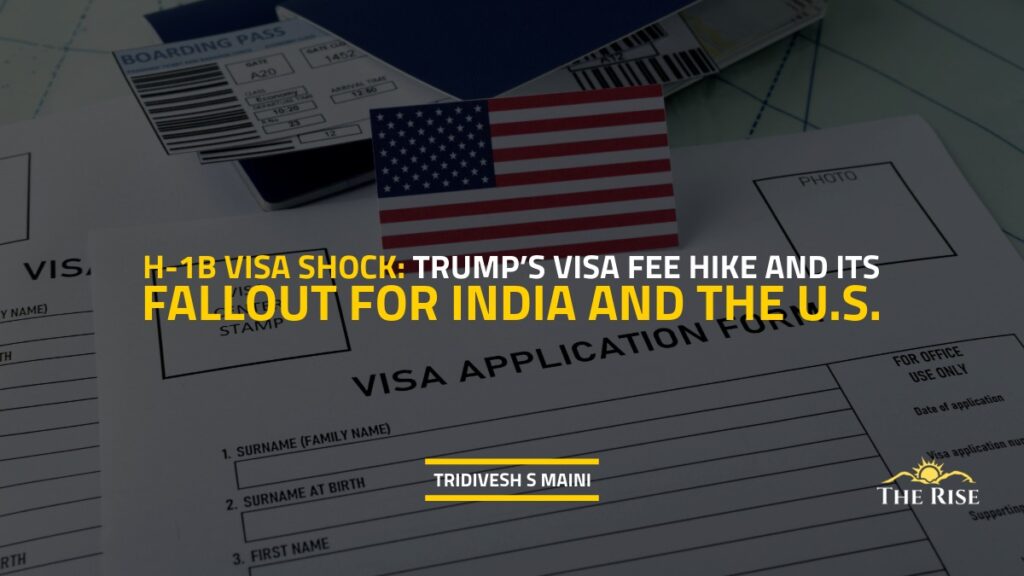Trump’s recent proclamation is likely to impact not just India but the US economy as well, so it is important to approach the issue without bias. It may also be premature to draw firm conclusions, as many believe that the Trump administration may reconsider the decision given its potential effects on the US economy.
In a move set to rattle the tech industry and foreign workers alike, U.S. President Donald Trump has signed a proclamation raising the annual H-1B visa fee to an unprecedented $100,000 per year. The H-1B visa is a work visa that allows American companies to hire overseas workers with specialised skills for a period of three years.
Trump justified the steep hike by arguing that the U.S. wanted only “very highly skilled” foreign workers and claimed that the existing system had been misused. The proclamation marks a continuation of his long-standing criticism of the H-1B regime. During his first tenure, the denial rate for H-1B applications had spiked to 15% in 2018, reflecting his administration’s tough stance on the program.
Also Read: Trump’s America First Doctrine: Rethinking U.S. Alliances, Power, and Global Strategy
Growing opposition to the H-1B visa system in the US
In his current tenure, the US President has given mixed signals vis-à-vis the H-1B system. There have been sharp differences between Trump’s Make America Great Again (MAGA) supporters and Elon Musk, CEO of Tesla, who was a part of Trump’s team until May 2025 as Chief of the Department of Government Efficiency (DOGE). While Musk had called for reform of the existing H-1B system to enable U.S. companies to hire talented workers from overseas, prominent voices within MAGA – such as Steve Bannon – were especially critical. Musk described the H-1B system as “broken,” while Bannon labelled it a “scam.”
It is worth noting that even some Democrats, like Bernie Sanders, have also been critical of the existing H-1B system. Commenting on H-1B visas, Sanders said they “replace good-paying American jobs with low-wage indentured servants from abroad.”
U.S. Commerce Secretary Howard Lutnick said that before taking this decision, US companies had been consulted. “If you’re going to train somebody, you’re going to train one of the recent graduates from one of the great universities across our land. Train Americans. Stop bringing in people to take our jobs,” he said.
Trump’s recent proclamation and opposition within the US
Trump’s decision has faced strong opposition from many quarters. Trump’s USD 100,000 H-1B visa fee decision is a “reckless attempt to cut America off from high-skilled workers who have long strengthened our workforce, fuelled innovation, and helped build industries that employ millions of Americans,” said US Congressman Raja Krishanmoorthi.
Reactions within India
Ever since 2015, over two-thirds of the beneficiaries of the H-1B visa have been Indians, mostly techies. In 2024, more than 70 percent of all H-1B visa holders were born in India, with over 2,80,000 Indians approved under the program.
In 2025, Amazon was the highest recipient of H-1B visas. Several Indian companies, including Tata Consultancy Services and Infosys, also benefited from the program. The Indian government, while cautious in its comments on the decision, pointed to the ‘humanitarian aspect’ of the decision in the context of its impact on families.
India’s leading IT industry body, the National Association of Software and Service Companies (NASSCOM), highlighted the point that a “one-day” deadline would cause immense uncertainty. It would also be pertinent to point out that several techies are from Andhra Pradesh (AP) and Telangana. Several leaders from India’s opposition also criticised the same. Revanth Reddy, Chief Minister of Telangana, while commenting on this decision, said, “It is for the Indian Government to immediately set up a mechanism to resolve this amicably, keeping the interests of our tech population and skilled workers, who have served America for so long.”
The Trump administration’s decision is likely to have a significant impact on India’s economy, though its full effects remain to be seen. One major ramification could be a dip in remittances. In 2024, India received remittances totaling $129 billion, with a significant 28% coming from the US.
Also Read: Trump versus India: The Hidden Risks to Kyiv’s Fuel and War Strategy
While the decision to raise fees for H-1B is likely to impact the Indian economy in several ways, several commentators and policymakers believe that this decision could be beneficial. A considerable amount of talent may return to India and contribute to India’s progress. Others suggest that Indian professionals in the US could also explore opportunities in non-Western countries.
Trump’s recent proclamation is likely to impact not just India, but the US economy as well, so it is important not to have a skewed approach vis-à-vis the issue. It may also be premature to reach any firm conclusions, since many believe that the Trump administration may have to do a rethink given the impact the proclamation could have on the US economy.
Disclaimer: The views expressed in this article are those of the author solely. TheRise.co.in neither endorses nor is responsible for them. Reproducing this content without permission is prohibited.

